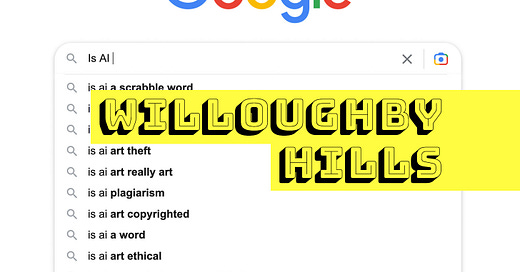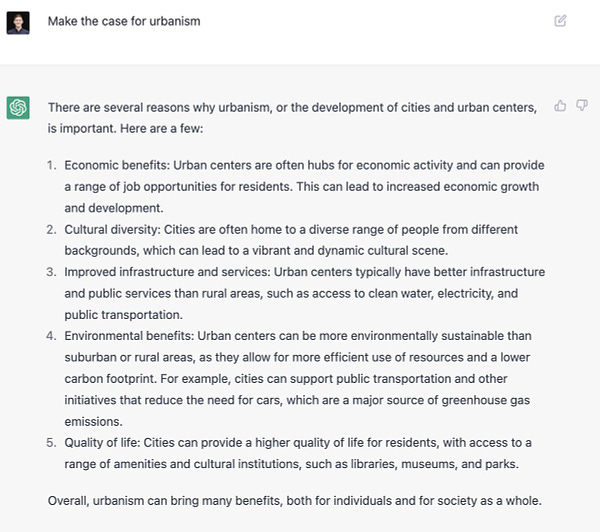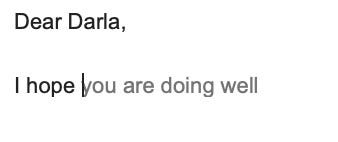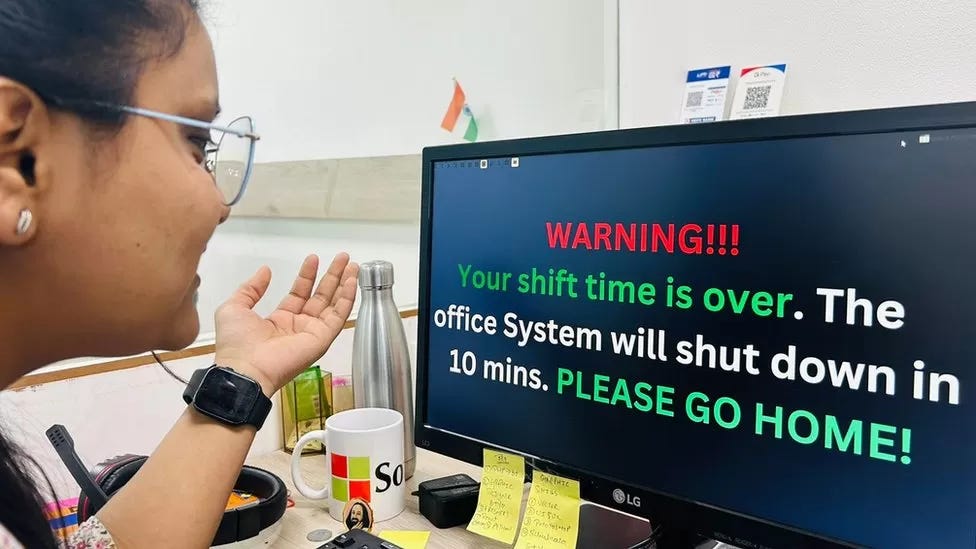Wednesday Walk: A Tool or Something More?
Examining the role that artificial intelligence can play in school, life, and more. Plus an update on maple season and examining work-life balance.
Welcome to Willoughby Hills!
As is typical every Wednesday, today I’m bring you a smattering of topics that I hope will make you a bit more curious about the world around you and give you something to think about later.
If you like what you’re reading, you can sign up to have this newsletter delivered to your inbox every Wednesday and Sunday for free:
Sugar Snow
On Sunday, I wrote about my process for making maple syrup at home. I also spent Sunday doing my third boil of the season, which resulted in 11 small bottles of finished syrup.
One of the more interesting parts of maple sugaring is observing the changes over the course of a single season, which is about four to six weeks. This is evident in the weather, which often starts off cold but feels like spring by the end. It’s observed in the trees, which begin to bud and come alive during this time. But even the syrup itself goes through changes.
Here’s a look at the results of my three boils from 2023. The first boil, on the left, is so light it looks like a pilsner. By the third boil, you can see it’s now a darker color, more like Coca-Cola.
There’s nothing that’s changed in my method- it’s still the exact same process. This color shift is a result of changes in weather and time.
According to the University of New Hampshire, a variety of factors can affect the color and flavor of syrup including the pH of the sap, the boiling time, the outside temperature, and the presence of bacteria and yeast. It’s complex, but if you like deep science dives, this article is interesting.
Before 2014, the bottle on the left would have been labelled as Grade A, whereas the bottle on the right would probably be Grade B. This old system often made consumers think Grade A was superior or more refined (like school grades), but there was no difference in production methods, only finished color.
New standards were adopted which now consider all maple syrups Grade A, but go on to rate them by color (Golden, Amber, Dark, Very Dark).
Yesterday morning, just as I was thinking my sap flow might be slowing, we were treated to some fresh snow.
I quoted from Laura Ingalls Wilder on Sunday but had left out a passage about “sugar snow,” which was interesting to me but didn’t seem relevant to the essay. Now that we have a bit of snow on the ground though, I felt like it was worth publishing that quote here:
“‘So that's why it's a sugar snow, because Grandpa is making sugar?’ Laura asked.
’No,’ Pa said. ‘It's called a sugar snow, because a snow this time of year means that men can make more sugar. You see, this little cold spell and the snow will hold back the leafing of the trees, and that makes a longer run of sap."‘When there's a long run of sap, it means that Grandpa can make enough maple sugar to last all the year, for common every day. When he takes his furs to town, he will not need to trade for much store sugar. He will get only a little store sugar, to have on the table when company comes.’"
Time will tell if we’re approaching the end of the season or if this snow means as much to me as it did to Grandpa Ingalls.
Just Another Tool?
For a few months now, I keep seeing ChatGPT posts like this taking over my Twitter timeline:
ChatGPT is an artificial intelligence (AI) writing program, similar to the AI art generator Dall-E 2, which I wrote about a few months ago (both are made by OpenAI).
My first reaction to Dall-E 2 was discomfort, but then I started using it more regularly for this newsletter, and I actually kind of enjoy it, although I still have pangs of guilt when generating imagery with it.
ChatGPT was being discussed on the public radio show 1A, which was playing in the background while I worked yesterday morning. The show was hosting a fascinating conversation about ChatGPT in the classroom and I wanted to share some highlights of what I heard.
Instead of openly embracing or scorning artificial intelligence, the conversation on 1A had nuance, which I appreciated. The panelists all acknowledged that this technology is here and is being used by students, so it’s up to educators to determine how to embrace it.
I was especially struck with the comments of Daniel Herman, a high school teacher in Berkeley, CA who wrote a recent piece in The Atlantic titled “ChatGPT Will End High-School English Class.” In his mind, the format of the high school essay is out of date for our current moment and requires a rethinking.
Herman feels that teachers have been wrestling with how best to mediate technology in the classroom for a long time, but that ChatGPT brings a new dimension to that problem:
“I think for the past few decades, it’s been a bit of an arms race for teachers to craft assignments that are, what I would call ‘unhackable.’ And it immediately became clear that the definition of what unhackable meant had changed irrevocably.”
Prompts like “Describe the significance of the green light in The Great Gastby” are helpful for those students that may choose to follow the career path of a literary critic or scholar, but it is also a question that is can be easily answered by an AI program, as the show demonstrated.
Pia Ceres, senior digital producer at Wired, noted in the 1A segment that if the prompt generates a valid response from AI software that can approximate a student’s work, is that particular question worth asking?
Herman agreed with her assessment and went on to say this:
“Honestly, who cares about the green light in Great Gatsby? We’ve collectively decided on this very narrow definition of what writing is and what we need students to be able to learn how to do. There’s just this certain standard of expository writing or sometimes narrative essay writing. One would never say that a student needs to graduate high school needing to write a sonnet or a short story… so why would this particular task about the green light be valued over way more interesting questions about: what does it mean to desire something? What does it mean to be excluded? These are all things that The Great Gatsby is offering and there’s a lot of data and research that shows that sort of writing- spontaneous, expressive, reflective writing- can actually be really beneficial for a student’s wellbeing.”
A listener wrote to the program and compared ChatGPT to a calculator. I think the comment was meant as a dig, as using calculators for math equations was often seen as “cheating” in all but the hardest math classes. But as automated cash registers, spreadsheets, and the like became ubiquitous for those that used to do mental math, the attitude on calculators in classrooms and everyday life is shifting.
Still, there is a fundamental question here: is AI a tool like a calculator, or is it something more?
The discussion on 1A reminded me a bit of the Amish approach to technology, which I’ve written about at length before.
Contrary to popular opinion, the Amish aren’t “anti-technology” per se, but rather, they take a nuanced and mediated approach to it. Their goal is to maintain local, people-based, and nature-based connections. Car travel, electricity, and even telephone use are permitted in some Amish communities at certain times based on need, but their use is not without limits and often are not allowed within the home.
Before a technology can be implemented in an Amish community, the leaders of the group assess what it is, how it works, and how it might impact the community. If it’s decided that the technology has the potential to break local bonds, its use is either thoughtfully constrained or outright forbidden.
I’m not sure how practical that would be for the bulk of American society. After all, AI has been infiltrating our writing in subtle ways for a few years. If you’ve tried to compose a message in Gmail, this will look very familiar.
The Google autocomplete function when searching works in the same way.
Many of us use this technology daily without giving it much contemplation. Is there really a material difference between letting AI finish our sentences and letting it compose entire paragraphs?
Wendell Berry (whom I’ve written about many times) published an essay in 1987 entitled “Why I Am Not Going to Buy A Computer” in which he defends his method of writing with a pen and paper. In that piece, Berry details what he considers when deciding whether to opt into a new piece of technology.
The new tool should be cheaper than the one it replaces.
It should be at least as small in scale as the one it replaces.
It should do work that is clearly and demonstrably better than the one it replaces.
It should use less energy than the one it replaces.
If possible, it should use some form of solar energy, such as that of the body.
It should be repairable by a person of ordinary intelligence, provided that he or she has the necessary tools.
It should be purchasable and repairable as near to home as possible.
It should come from a small, privately owned shop or store that will take it back for maintenance and repair.
It should not replace or disrupt anything good that already exists, and this includes family and community relationships.
I like to revisit this list from time to time, especially when considering my own relationship to new technology. It can be tempting to jump into something new and not look back, but I think a moment of contemplation is worthwhile.
AI has the ability to massively shift our world and our way of life. I don’t want to openly embrace it yet, but I also don’t think we should be cowering away from it. There is a middle ground that allows us to explore how the technology works and how it may benefit us, while still being mindful about what our relationship to it can and should be.
Closing Time
I often talk about work-life balance in this newsletter. The balance of power seems to have shifted from workers back to companies at the moment, with recent massive layoffs in the tech and media sectors and return to office mandates across many industries that had seemed well suited for remote work.
So it was nice to run across a story in the BBC about the Indian tech company SoftGrid, which created software to warn employees of the end of their shift and automatically shut down their computers at 7:00pm, encouraging them to leave on time and not work long hours.
“Shweta Shukla, CEO and co-founder of SoftGrid, says that the notification was part of the company's efforts to help employees enjoy a better work-life balance.”
The leadership of a company sets the tone for the entire business, and it’s refreshing to hear a CEO not only favorably discuss work-life balance, but implement policies to ensure it’s really happening.
Thank you for reading! I always love hearing your thoughts, so please drop a line in the comments.
I publish new issues every Wednesday and Sunday. Sign up to always receive the latest issue and support my work:
Other Wednesday Walks
Freakazoid! Jeb! and Doris Kearns Goodwin
Please consider sharing this with a friend that you think might enjoy it or you can post it on social media.
If you’ve missed past issues of this newsletter, they are available to read here.
Stay Safe!
Heath












I am a big early adopter. So change is usually well received by me at work. AI is increasingly being used in medicine and it supports my belief that data should drive decisions. We all have stories about gut feelings. But follow the data and you will find trends and outcomes. I am however very sad to see the demise of the very idiosyncratic cursive handwriting. I cannot find anything similar to replace it.
AI writing tools are great, and perhaps their very existence will be good for high school essays, because now you have to come up with prompts that the AI struggles with, those that involve deep personal reflection and experience. AI is perfect for giving outlines and a starting point, but especially when it comes to topics that’ll require close readings and in depth research and analysis, AI is still quite limited.
The points that Berry made about technology are interesting, but I believe short sighted. I do agree with having technology that mom and pops can sell and repair though. I don’t like handing over my ability to be productive to the whims of public ally owned corporations either. My wife and I recently switched over to all Apple products because our PCs kept breaking down over and over again, after being loyal PC owners and users our entire lives. It comes down to very limited choices with tech today, and I don’t like it either. But my feelings on Berry and his essays are mixed. He brings up good points, and I completely respect his way of writing the old fashioned way, but his often very conservative viewpoints rub me the wrong way. Tech can be divisive but also bring people together in new and unexpected ways, so I always have cautious optimism when it comes to any new emerging tech.